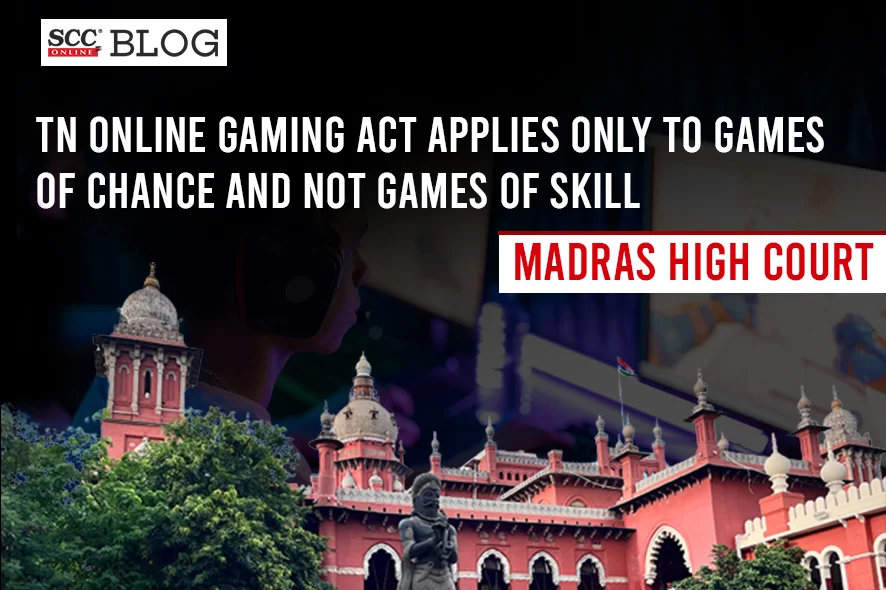Madras High Court: In a petition filed under Article 226 of the Constitution of India seeking a writ of declaration to declare Tamil Nadu Prohibition of Online Gambling and Regulation of Online Games Act, 2022 as ultra vires, the bench comprising of Sanjay V. Gangapurwala, CJ and P.D. Audikesavalu J held the impugned Act can only apply to games of chance and not games of skill. Hence, the Act in its entirety, need not be held to be ultra vires. The Court also noted that the State is competent to legislate to the extent of prohibiting online gambling, i.e., games of chance. At the same time, it has got the authority to regulate online games of skill.
Brief Facts:
In the present case, the petitioners assail the constitutional validity of the Tamil Nadu Prohibition of Online Gambling and Regulation of Online Games Act, 2022. It was alleged that the impugned Act is solely based on the report submitted by the Committee under the Chairmanship of Justice K.Chandru (Retd.). The said report has arbitrarily categorised games of skill, i.e., online rummy and online poker, to be games of chance and is directly in the teeth of the law settled by the Division Bench of this Court in the case of Junglee Games India Pvt Ltd v. State of Tamil Nadu, 2021 SCC Online Mad 2762, and that of the Supreme Court in a catena of judgments.
It was also alleged that the Government of India, vide notification dated 23.12.2022, has amended the allocation of Business Rules and designated the Ministry of Electronics and Information Technology as the nodal Ministry for regulation of online games. Entry 31 read with Entry 14, List I (Union List) of the VII Schedule of the Constitution of India deals with posts, telegraphs, telephones, wireless, broadcasting and other like forms of communication. The same is a Union Subject and the State of Tamil Nadu has no power to legislate with regard to the same. Also, the I.T Amendment Rules recognises the term “online gaming intermediary” and defines it as an intermediary, which enables the users of its computer resource to give access to online games. The I.T. Amendment Rules have placed the online gaming intermediary at par with the “significant social media intermediary”.
It was further submitted by the Petitioners that the word “betting” cannot be segregated from “gambling” in order to create an alternate field of regulation by the respondent State. The State can only legislate on betting pertaining to gambling, inter alia, betting only on games of chance.
Analysis and Decision
The Court held that the State has got the authority to legislate on online games of chance, as gambling would be betting on the games of chance, it is not necessary to declare Sections 7, 8 and 9 of the impugned Act as ultra vires. The Court held through catena of Supreme Court judgments that the games of rummy and poker are games of skill.
The Court noted that the State has miserably failed to demonstrate that online games of rummy and poker are different and distinct from offline games of rummy and poker. The apprehension expressed by the State that bots may be used or the dealer (software) would know the cards are without any substantive material. In view thereof, The Court set aside the Schedule under Section 23, incorporating rummy and poker as games of chance.
The Court further suggested the State to make regulations as contemplated under Section 5 of the impugned Act, and thereby providing reasonable regulations for the time limit, age restriction or such other restrictions in regard to playing of online games.
[All India Gaming Federation v. The State of Tamil Nadu, 2023 SCC OnLine Mad 6973, date of decision 09.11.2023]
Advocates who appeared in this case :
For the Petitioner in W.P.No.13203 of 2023
Mr.Sajan Poovaiya, Senior Counsel; Mr.V.Ragavachari, Senior Counsel; Ms.Deepika Mulari, Mr.Pradeep Nayak, Mr.Samkeeth Vittal, Mr.Pratiks Bhadri Narayan S, Ms.Shreya Narayanan
For the Petitioners in W.P.No.13593 of 2023
Dr.Abhishek Manu Singhvi, Senior Counsel assisted by Mr.Suhaan Mukherji, Mr.Harsh Hiroo Gursahani, Mr.Nikhil Parikshith,
Mr.Abhishek Manchanda, Mr.Sayandeep Pahari, Mr.Arun Karthik Mohan, Ms.Ashwini Vaidialingam, Mr.L.Nidhiram Sharma
For the Petitioners in W.P.No.13720 of 2023
Mr.C.Manishankar, Senior Counsel for Mr.R.S.Diwaagar
For the Petitioners in W.P.No.13722 of 2023
Mr.Satish Parasaran, Senior Counsel for Mr.R.S.Diwaagar
For the Petitioners in W.P.No.14704 of 2023
Mr.Mukul Rohatgi, Senior Counsel for Mr.R.S.Diwagar, Mr.Akhil Anand, Mr.Himanshu Vij, Mr.Bharadwaj Ramasubramanian, Mr.Durga Bose Gandham
For the 1st Respondent in W.P.Nos.13203, 13720, 13722 & 14704 of 2023
Mr.Kapil Sibal, Senior Counsel assisted by Ms.Aparajita Jamwal
For the 2nd Respondent in W.P.Nos.13203, 13720, 13722 & 14704 of 2023 and for the sole Respondent in W.P.No.13593 of 2023
Mr.R.Shunmugasundaram, Advocate General assisted by Mr.P.Muthukumar State Government Pleader, Ms.A.G.Shakeena and Mr.B.Thiyagarajan.
For the 3rd Respondent in W.P.Nos.13203, 13720, 13722 & 14704 of 2023
Mr.Amit Anand Tiwari, Additional Advocate General, Supreme Court assisted by Ms.Devyani Gupta and Mr.Amartya A.Sharan.
For the 4th Respondent in W.P.Nos.13203, 13720, 13722 & 14704 of 2023
Mr.P.Muthukumar, State Government Pleader assisted by Mrs.R.Anitha, Special Government Pleader; Mr.K.M.D.Muhilan Additional Government Pleader and Mr.K.Karthik Jagannath, Government Advocate







